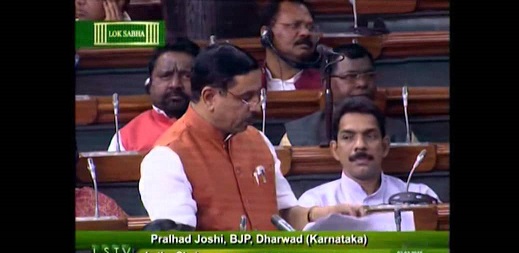By Our Correspondent
NEW DELHI/BHUBANESWAR: Amid Oppositions protest, Lok Sabha has passed the Mines and Mineral Laws (Amendment) Bill.The bill will open up the Coal sector for commercial mining and allow domestic as well as global companies to invest.The Bill, once it is passed by the Rajya Sabha, will replace the Mineral Laws (Amendment) Ordinance, 2020.
The ordinance, which was cleared by the cabinet in January this year, had brought amendments to the Mines and Minerals (Development and Regulation) Act, 1957, and the Coal Mines (Special Provisions) Act, 2015. The ordinance was promulgated on 10 January.
Under the Coal Mines (Special Provisions) Act, 2015, there was no provision for grant of composite prospecting licence-cum-mining-licence in respect of coal/lignite.This would also allow the implementation of the 100 per cent foreign direct investment through automatic route for sale of coal.The amendments also removed the current end-use restrictions that are in place for those participating in auctions.
For instance, the working mining leases of Odisha are expiring by March 31, 2020. These leases produced about 58 million tonnes of iron ore, 1.80 million tonnes of chromite and 0.77 million tonnes of manganese during the year 2018-19, the statement said. Statutory clearances required to start the mining operations for the new leases have to be granted expeditiously to enable the new lessees to continue the mining operations.
Under the old rules, the new lessee has to obtain 20 approvals to start the mining operations, of which 9 are related to different central ministries and the remaining are from the state governments.In normal course, the minimum time period required to obtain these approvals vary from two to three years. This whole process would delay the commencement of mining operations by the new lessees, according to the statement.
Once enacted, the bill will pave the way for the central government to go ahead with the auction of coal mines for commercial purposes by even allowing companies, which do not possess any prior coal mining experience in India, but are financially strong and or have mining experience in other minerals or in other countries to participate in auction of coal/lignite blocks.
Removing the restrictions will allow a successful bidder or allottee to utilise mined coal for own consumption, sale or for any other purpose specified by the government, thereby allowing for wider participation and competition in auction.
These two crucial aspects — liberalising the eligibility criteria for participating in the auction and removal of end-use restrictions — will attract large investments in the sector and foreign direct investment too.
But the amended bill has this provision.A coal or lignite block could either be allocated for prospecting or mining license. A prospecting license is given for exploring and finding mineral deposits, while granting a composite license help increase the inventory of coal/lignite blocks for allocation by making available coal blocks with different grades and in a wide geographical distribution.
Another restrictive provision in the Mines and Minerals (Development and Regulation) Act, 1957, which required prior approval of the central government even in cases where the allocation or reservation of coal/lignite block has been made by the Centre itself, has been done away with.
This will go a long way in reducing the time taken for operationalisation of coal/lignite mines.
Expeditious reallocation of license to new lessees. Under the Mines and Minerals (Development and Regulation) Act, 1957, a new lessee who won a mining lease for specified minerals other than coal, lignite and atomic minerals could start operations only after acquiring all statutory clearances.
But now a new section, 8B, has been introduced in the amended bill that extends the various statutory clearances given to the previous allottee to the new lessee for a two-year period.The new allottee can continue mining operation during this time. But he will have to acquire all the clearances within this two-year period.
The objective of the amendment is to ensure the continuity of production of minerals, said an official of the Ministry of Mines.
Besides, the central government will have the power to prescribe the conditions for the new lessees to commence production within the time period of two years for starting the production.
This will promote ease of doing business, according to a government statement issued in January after the ordinance was approved, and will benefit the holders of auctioned brownfield mining leases on expiry of their lease period starting from March 2020 and then from March 2030.






















